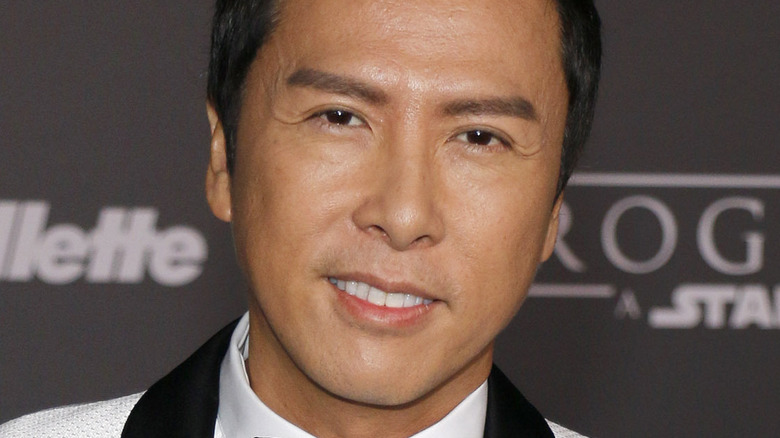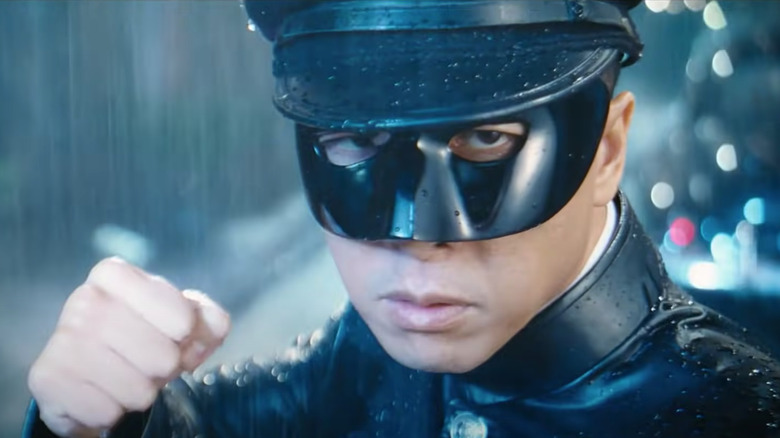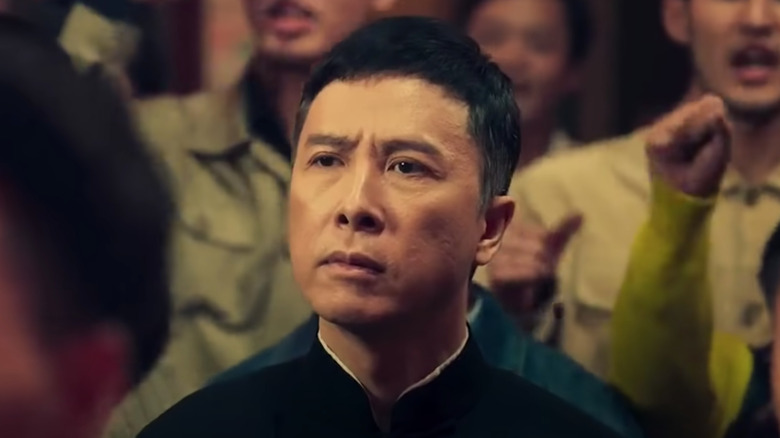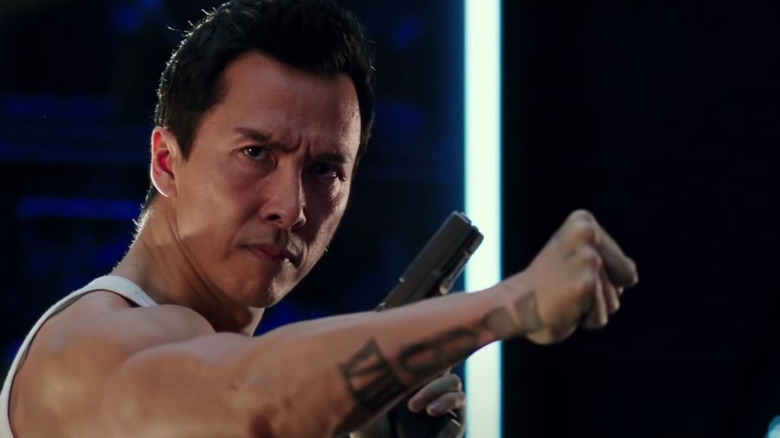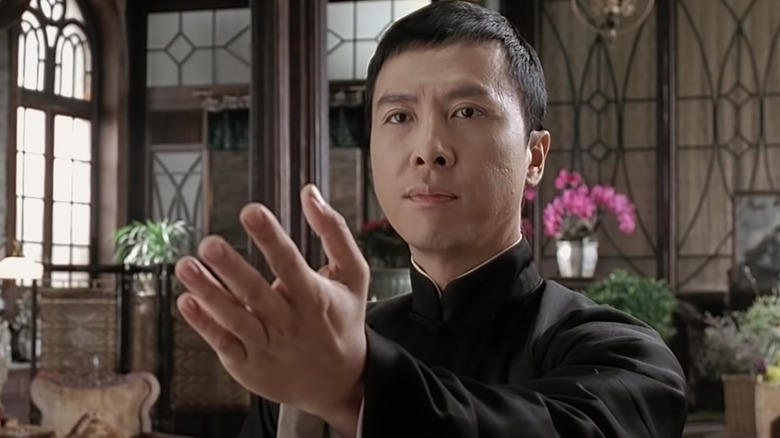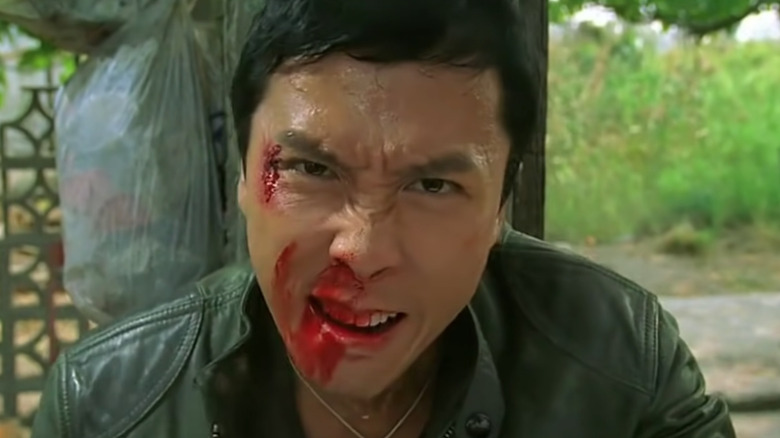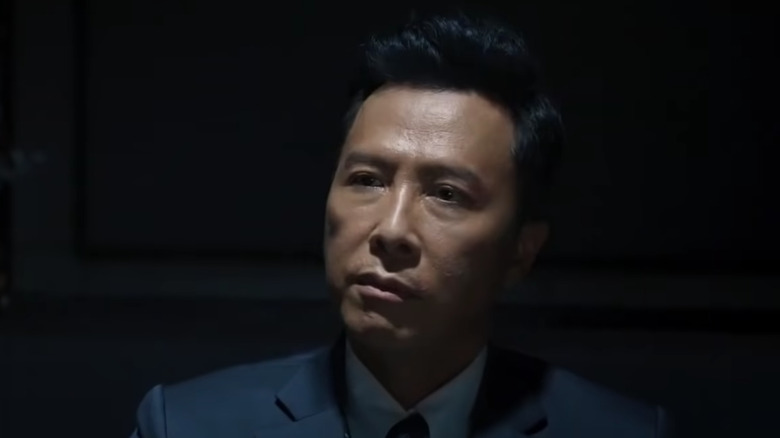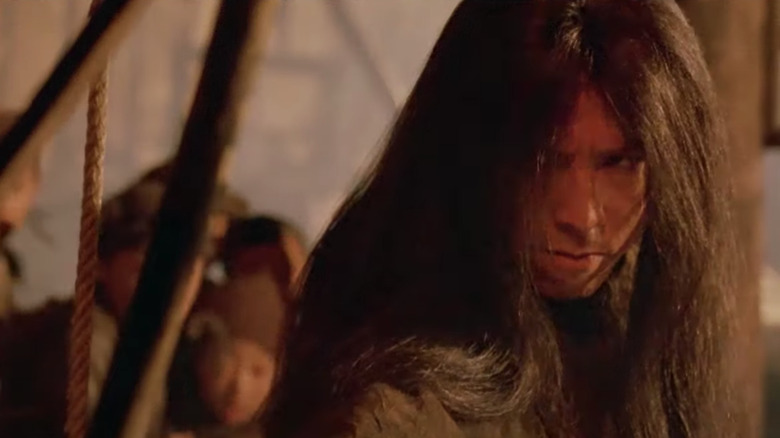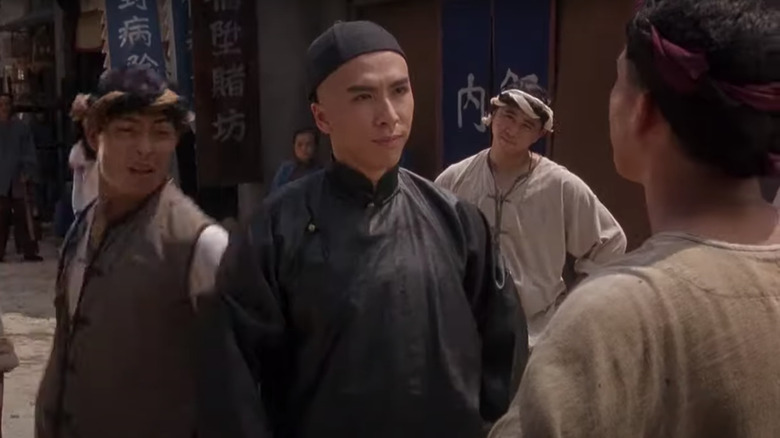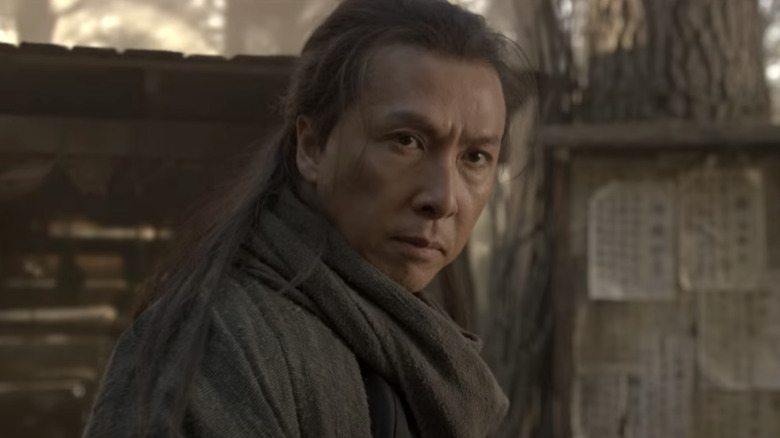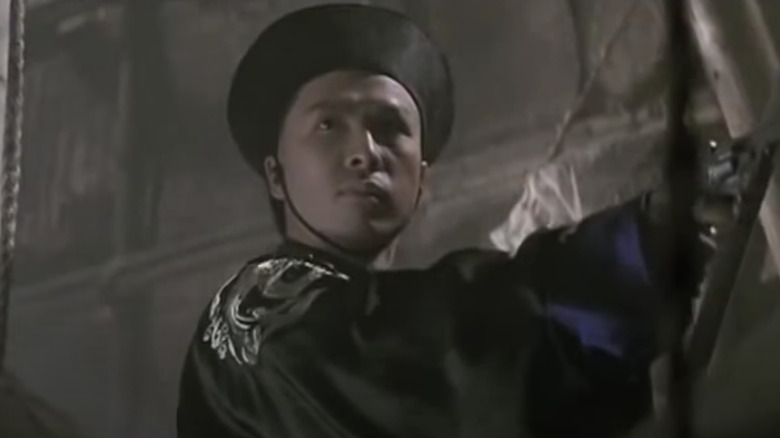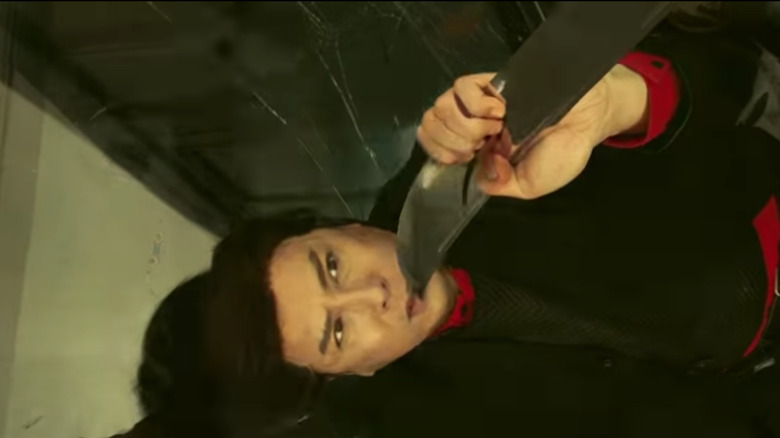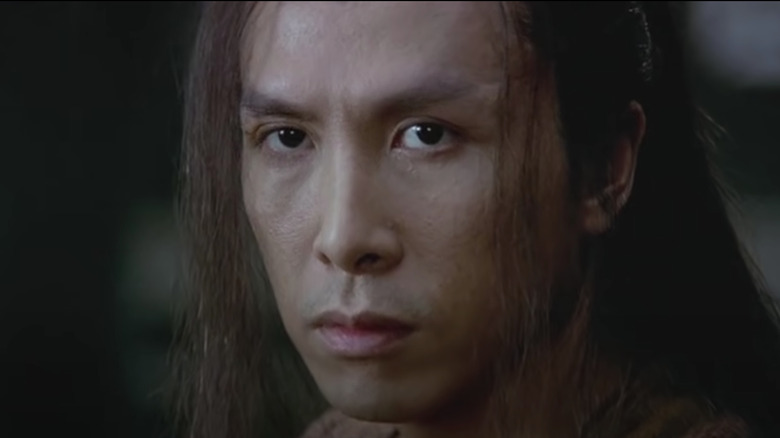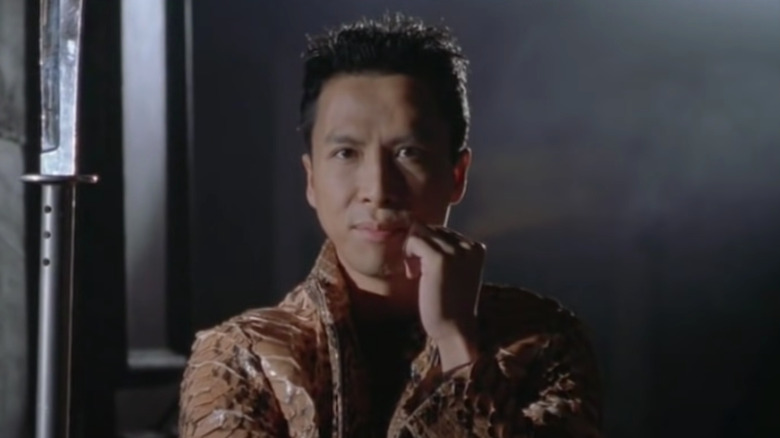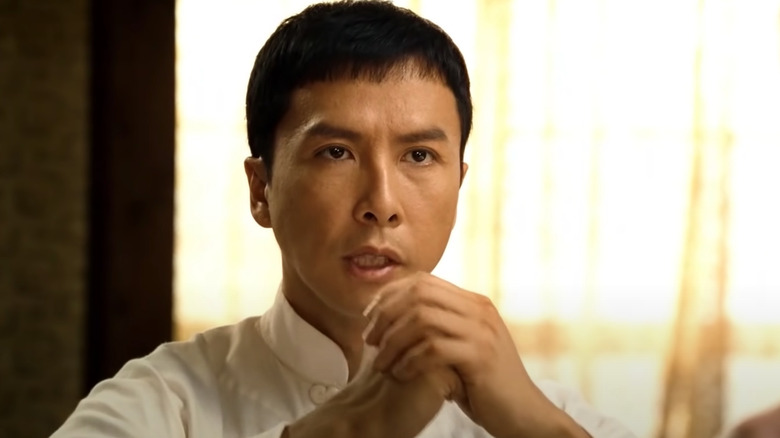The 7 Best And 7 Worst Donnie Yen Movies Ranked
Donnie Yen is a legend in the world of martial arts action cinema. His name might not be quite as well known in the U.S. as the likes of Jackie Chan or Jet Li, but fans and scholars of the martial arts genre hold just as much reverence for Yen as for those larger names. In addition to performing in front of the camera, Yen is also a prolific action director and choreographer who is personally responsible for many of the fight scenes in his films, and he also has a successful track record as a producer. Outside of the film industry, Yen has proven his real-world fighting ability by winning several martial arts tournament world championship titles.
With an acting career that spans four decades, Yen continues to put out high-quality, physically demanding movies even as he approaches the age of 60. Yen has found the most success making movies within the Hong Kong film industry, while his occasional forays into Hollywood filmmaking haven't fared quite as well as those of some of his contemporaries. "Rogue One: A Star Wars Story" was a notable English-language film for which Yen received both critical praise and a large box office showing, and his upcoming villain turn in the fourth "John Wick" film may continue to build him even more cache with American audiences.
Taking the breadth of Yen's career in Hong Kong and the U.S. into account, these are his seven best and seven worst movies based on their aggregated critic scores on Rotten Tomatoes.
Worst: Legend of the Fist: The Return of Chen Zhen
Despite boasting an incredibly exciting opening action set piece that uses World War I as a backdrop for some fun kung-fu and parkour hijinks, "Legend of the Fist: The Return of Chen Zhen" unfortunately falls flat once the story is set in motion. To get the proper experience of the film, it is important to have an understanding of the complex lore of Chen Zhen, the titular character played by Donnie Yen. As the title implies with "The Return," this is not the first film to feature Chen Zhen, but tracking the complex lore of the character can be difficult for western audiences.
Chen Zhen's first appearance can be found in the film "Fist of Fury" from 1972, in which he is portrayed by the legendary Bruce Lee. The character was incorporated into several other properties over the decades and has been played by many actors, including Jet Li in the 1994 martial arts classic "Fist of Legend," which is a remake of "Fist of Fury." "Legend of the Fist: The Return of Chen Zhen" isn't even the first time the character was played by Yen. The '90s television series "Fist of Fury" saw Yen playing the role.
Understanding the legendary status of the Chen Zhen character doesn't help the "Legend of the Fist" movie fare much better. The film, which got middling reviews from critics, looks slick, but its fatal flaw is a lack of action sequences. Aside from the opening set piece, the film fails to deliver on the quality and quantity of action that fans of the genre demand, and it winds up as a dull and unengaging affair as a result.
Best: Ip Man 4: The Finale
If there is a single character that Donnie Yen is most closely associated with, it is undoubtedly Ip Man, a grandmaster of the Wing Chun martial arts style. Ip Man was a real person who led a troubled but incredible life, leaving his own mark on the movie industry even before a single movie had been made about him by famously serving as the teacher of screen icon Bruce Lee.
"Ip Man 4: The Finale" is the conclusion to Yen's run with the character, though there have already been additional "Ip Man" movies made in the years since its release in 2019, like 2021's prequel "Ip Man: The Awakening." In a major change of scenery from the previous three Yen-helmed "Ip Man" movies, "The Finale" finds the titular character relocating from China to the United States after the passing of his wife. He settles in San Francisco, where he deals with the difficulties of establishing a new Wing Chun school while facing violent racism from Americans, especially from the film's main antagonist Barton Geddes, a Gunnery Sergeant in the Marines played by English martial arts legend Scott Adkins. Yen and Adkins will team up again in the fourth "John Wick" film. "Ip Man: The Finale," which got glowing reviews from critics, is also notable for being the first to finally show the titular character actually teaching Bruce Lee, though Lee was introduced briefly in "Ip Man 3."
Worst: xXx: The Return of Xander Cage
It likely won't come as a surprise to find out that the majority of Donnie Yen's lowest-rated movies consist of his English-language output while all seven of his highest-rated movies were produced, at least in part, within the Hong Kong film industry. When it comes to martial arts, the Hong Kong and American film industries take vastly different approaches to shooting and editing action, a sentiment Yen broke down in an interview with Looper.
"xXx: The Return of Xander Cage" is the third installment in the "xXx" movie series. The middle film, "xXx: State of the Union", which swapped out Vin Diesel for Ice Cube in the lead role, has the series' lowest score on Rotten Tomatoes, but the entire trilogy received "Rotten" ratings across the board. This 2017 installment landed only a slightly worse score than the original.
As the title implies, Diesel returned in the titular role of Xander Cage, an adrenaline junkie extreme sports athlete who gets inexplicably involved in over-the-top international espionage. Yen was a new addition to the cast this time around, as was the talented Thai martial artist Tony Jaa, but the presence of Hong Kong and Thai stars with major action chops wasn't enough to save the film's poor presentation and ludicrous writing, involving crashing satellites and crazy transforming motorbikes that ski across water. A fourth "xXx" movie is apparently in the works, though Yen is not amongst the cast members currently confirmed to be returning (via Cinema Blend).
Best: Ip Man
Similar to the broad range of Chen Zhen movies, "Ip Man" is just one of dozens of movies that follow Ip Man as a central character. Beyond the numbered sequels, there are canonical spin-offs like "Master Z: The Ip Man Legacy," non-canonical sequels like "Ip Man: The Final Fight," TV shows like 2013's "Ip Man," prequels like "Ip Man: The Awakening" and "The Legend Is Born: Ip Man," and even an Oscar-nominated alternative telling of the story in Wong Kar-Wai's "The Grandmaster." The sheer size and complexity of the constantly expanding "Ip Man" universe gives the MCU a run for its money.
By the time director Wilson Yip's "Ip Man" released in 2008, Donnie Yen had been starring in great martial arts films for decades, but the Ip Man character helped him break through to larger worldwide audiences than ever before, earned Yen numerous award nominations and wins, making the Ip Man character and the Wing Chun style cultural touchstones. The first film in the series follows the titular character as he and his community fall upon dire times as the Japanese occupation of China begins and they are subjected to abject poverty and martial law. The story is gripping, and the fight scenes are incredible. "Ip Man," which got rave reviews, is an all-around excellent martial arts film and makes for a great entry point into Yen's filmography.
Worst: Flash Point
"Flash Point" received a rotten score from critics on Rotten Tomatoes, but general audiences enjoyed it considerably more. The reason for the film's divisive nature likely comes down to the steep difference in quality between the movie's story and its action. The story is a bland and generic crime thriller, consisting of little more than a bundle of cops-versus-criminals cliches, but the action sequences are spectacular when they take the focus, especially the prolonged ending fight scene between Donnie Yen and Collin Chou.
Before they found massive, newfound success with "Ip Man" the following year, Yen and Wilson Yip worked together as star and director on "Flashpoint." Wilson Yip directed all four of the Yen-helmed "Ip Man" movies and also directed him in the well-received "Dragon Tiger Gate" and "Kill Zone." "Flash Point" is also noteworthy for being one of the first films to introduce an MMA fighting style to Asian cinema, which was a personal goal of Yen's for several years. "Flash Point" might be one of Yen's lowest-rated films, but if you skip to the fight scenes, you might still have a good time.
Best: Raging Fire
The most recent film on the list is 2021's "Raging Fire," and it's also one of Donnie Yen's best, according to Rotten Tomatoes critics. This action flick follows the explosive confrontation between a hero cop (Yen) and his former protégé-turned-criminal (Nicholas Tse) who's serving a stint in prison. The story is kept simple enough to allow the action to take center stage.
"Raging Fire" is the final film from Hong Kong action filmmaker Benny Chan, who previously directed a number of well-received action movies, including a few Jackie Chan movies like "Rob-B-Hood" and "New Police Story." Benny Chan was hospitalized during the post-production process of "Raging Fire" and died in 2020, from cancer, before the film was released.
Chan's filmography concluded on a high note, with "Raging Fire" earning strong reviews from critics and audiences alike. In a review for Variety, critic Richard Kuipers wrote that the film's simple story was "raised several notches above the ordinary by intricate plot details, a high quota of outstanding set-pieces and excellent performances by Yen and co-star Nicholas Tse." "Raging Fire" was a big hit at the 2022 Hong Kong Film Awards, earning eight nominations, including nods in the major categories of Best Action Choreography, Best Editing, Best Picture, and a Best Director nomination for the late Benny Chan, winning the latter four awards.
Worst: Seven Swords
"Seven Swords" is a film that had a ton of potential but ultimately fell apart in execution. The film is a period-piece set in 1600s Manchuria and features a plot that is essentially a retelling of the story of "Seven Samurai." This failure comes as especially surprising considering the talents of the expansive cast, the prestigious source material — the film is adapted from the epic wuxia novel "Qijian Xia Tianshan" — and the pedigree of the film's director, Tsui Hark. As one of Hong Kong's legendary martial arts filmmakers, Tsui has directed more than 50 movies throughout his career, including much better-received Donnie Yen movies like "Dragon Inn" and "Once Upon a Time in China II."
"Seven Swords" turned out to be such a mess as a result of the film's being butchered in the editing room. The released cut is 153 minutes long, but Tsui's original cut of the film was about four hours (per Ain't It Cool News). Cutting so much material was bound to be disastrous, and what remains is a film that feels overstuffed with characters and chopped-up subplots to the point of feeling not just truncated but outright confusing and hard to follow. It is a shame that the film wasn't released in its proper form, as Tsui's director's cut was surely leagues better than the messy, compromised "Seven Swords" that hit theaters in 2005. Tsui also said he initially planned for the film to be first in a seven-part series, but none of the sequels were ever made (per China Daily)
Best: Iron Monkey
"Iron Monkey" is a 1993 kung fu movie with an old-school style reminiscent of the wuxia greats of decades prior, with fun, over-the-top wire work and crazy set pieces like a three-way fight carried out on an array of wooden poles atop a raging fire. The titular Iron Monkey character is a master martial artist and skilled thief who makes it his mission to continually rob corrupt government officials and distribute the wealth to the impoverished villagers suffering under unjust rule — essentially a kung-fu variation of the classic "Robin Hood" story set in 1800s China with a dash of "Zorro," owing to the Iron Monkey's secret identity.
The film was directed by Yuen Woo-Ping, one of the true masters of martial arts cinema. Yuen's name has been attached as director or action-director to everything from early Jackie Chan movies like "Drunken Master" to recent Donnie Yen movies like "Ip Man 3" and "Ip Man 4: The Finale." His English-language work is no less impressive, as Yuen handled the action for series like "The Matrix" and "Kill Bill." And speaking of "Kill Bill," it was Quentin Tarantino who personally brought "Iron Monkey" to the U.S. Though the film was released in China in 1993, it wasn't until Tarantino got involved with the film's distribution that it finally reaches the American market in 2001 with the label "Quentin Tarantino presents" amended to it to draw in a wider audience, earning great reviews in the process (via the Los Angeles Times).
Worst: Crouching Tiger, Hidden Dragon: Sword of Destiny
2000's "Crouching Tiger, Hidden Dragon" is one of the most highly acclaimed martial arts films ever made. With farther international reach than most movies of its kind ever achieve and even pulling off the incredibly rare feat of winning multiple Oscars as a wuxia film, "Crouching Tiger, Hidden Dragon" secured a strong legacy in the history of martial arts cinema. The high profile of this earlier film made the long-awaited sequel, "Crouching Tiger, Hidden Dragon: Sword of Destiny," all the more disappointing.
Though 16 years had passed between the original "Crouching Tiger, Hidden Dragon" and this Netflix-produced sequel, there was still plenty of potential for this belated follow-up. The film again pulled its source material from a collection of stories known as the Crane Precious Sword Crouching Iron Pentalogy. Michelle Yeoh returned in the lead role, Donnie Yen stepped in as a new character to fill the void left behind by Chow Yun-Fat's main character from the original, and the legendary Yuen Woo-Ping — who choreographed the original film — took over the directorial duties from the original film's director, Ang Lee.
Unfortunately, this remarkable gathering of talent wasn't able to create a film that lived up to the legacy of the original film or stand up on its own merit. Critics came down hard on the film, such as David Sims of The Atlantic, who wrote: "With all of the first film's startling beauty and emotional subtlety lost, even [the film's] established stars look uninspired in their roles."
Best: Once Upon a Time in China II
The "Once Upon a Time in China" series was a long-running franchise spearheaded by kung-fu maestro Tsui Hark. The series varies greatly in quality as well as in terms of the talent involved, sometimes swapping out actors and directors from film to film. The most critically acclaimed entry in the series was "Once Upon a Time in China II," which was also the only entry to star Donnie Yen.
Jet Li returned for this sequel in the lead role of Wong Fei-Hung, a Chinese folk hero. He was a real martial artist from the 1800s who has achieved near-mythic status as the subject of nearly 100 Chinese movies, where he has been portrayed by numerous actors, including Jackie Chan. "Once Upon a Time in China II" picks up where the previous film (deemed one of the best kung fu movies of all time) left off and continues Wong's adventures, this time running afoul of a cult known as the White Lotus Sect. Yen co-stars as a violent military official who winds up becoming Wong's main adversary. Yen earned his first nomination at the Hong Kong Film Awards for this antagonist role in the Best Supporting Actor category. He would go on to rack up 11 Hong Kong Film Awards nominations and four wins (and counting) throughout his career.
Worst: Iceman
At the bottom of the barrel of Donnie Yen's filmography, you will find the likes of "Iceman." This fantasy-action comedy movie released in 3D follows Yen as a Ming Dynasty warrior who becomes frozen in ice and eventually thaws in modern-day Hong Kong, where he continues to battle against new and old adversaries. The ridiculous plot was a major negative for most Rotten Tomatoes critics, but so were the action sequences, which critics found marred with bad visual effects and cheesy, distracting 3D.
"Iceman" was intended to be the first chapter in an expansive martial arts saga. Though a full franchise has yet to develop — and may never come to fruition — a sequel was released four years later titled "Iceman: The Time Traveler." This second film was even more poorly received by audiences and critics alike. Yen served as the star, action director, and producer for both "Iceman" movies but wound up suing the sequel's distributor after they blamed him for the movie's failure in an official blog post (via South China Morning Post).
Best: Hero
The Oscar-nominated "Hero" from 2002 is a strong contender for the title of the most recognized and highly acclaimed wuxia film amongst western audiences, besides "Crouching Tiger, Hidden Dragon." Following in the footsteps of that earlier breakthrough international hit, "Hero" is a gorgeously presented martial arts period piece of epic proportions. For its innovative and impressive use of color (per The New York Times), complex story, and stunning action sequences, the film was a big hit at the 2003 Hong Kong Film Awards, racking up a staggering 14 nominations and seven wins.
Jet Li stars in the lead role as a nameless master swordsman and unreliable narrator of this nonlinear tale who claims to have killed the land's top three assassins, who all aim to kill the King of Qin (Daoming Chen). Donnie Yen plays the supporting role of Sky, the first of the assassins, who wages mental battle with Li's character in one of the film's most memorable and inventive action scenes. "Hero" was another Yen film that Quentin Tarantino personally fought to secure U.S. distribution for through Miramax as a "Quentin Tarantino presents" movie (via MTV News).
Worst: Highlander: Endgame
Donnie Yen's absolute worst movie according to Rotten Tomatoes critics is "Highlander: Endgame." The first "Highlander" movie, about an immortal Scottish swordsman waging battle in modern-day New York, was successful enough to spawn an entire "Highlander" franchise to follow it. With five mainline movies released over the course of two decades, a Japanese anime spin-off movie, an animated series, and multiple live-action TV shows, the "Highlander" franchise eventually wore out its welcome with even its most loyal fans. "Highlander: Endgame," was the fourth movie in the series but followed the continuity of the first live-action TV show rather than picking up where the last movie left off.
Not getting off on the right foot in the U.S. film industry, "Highlander: Endgame" was Yen's first American movie. Yen served as the film's fight choreographer in addition to playing the supporting role of Jin Ke, an assassin. Luckily, Yen landed a job choreographing fights and playing a supporting role in the better-received English-language movie "Blade II" shortly afterward, keeping his foray into American moviemaking from being over before it could get off the ground.
Best: Ip Man 2
It is fitting that the role Donnie Yen is most closely associated with would secure the top spot from Rotten Tomatoes critics as his highest-rated movie. "Ip Man 2" was the most beloved entry in the series, but it is worth noting that all of Yen's "Ip Man" movies made it into his top seven with the exception of "Ip Man 3" (though even the lowest-rated entry in the series was still certified "Fresh").
"Ip Man 2" picks a while after the events of the first film, finding Ip Man moving with his family to Hong Kong, where he strives to open his own Wing Chun school, much to the chagrin of the city's other martial arts school masters, especially the master of the Hung Ga school, played by martial arts legend Sammo Hung. Hung previously served as the action director of the first "Ip Man" film before returning in that capacity for the sequel and also taking on one of the lead roles. He did not return for the subsequent sequels.
"Ip Man 2" also features a secondary antagonist in the form of a foreign boxer named The Twister (Darren Shahlavi) who arrives determined to crush the locals in a xenophobic display of racial superiority, with Ip Man being the only fighter capable of stopping him. The storytelling is strong, the characters are distinctive, the villain is contemptible, and the fight scenes are arguably the best of the series, making "Ip Man 2" the clear choice for the best of the "Ip Man" series and the best of Yen's overall body of work.
